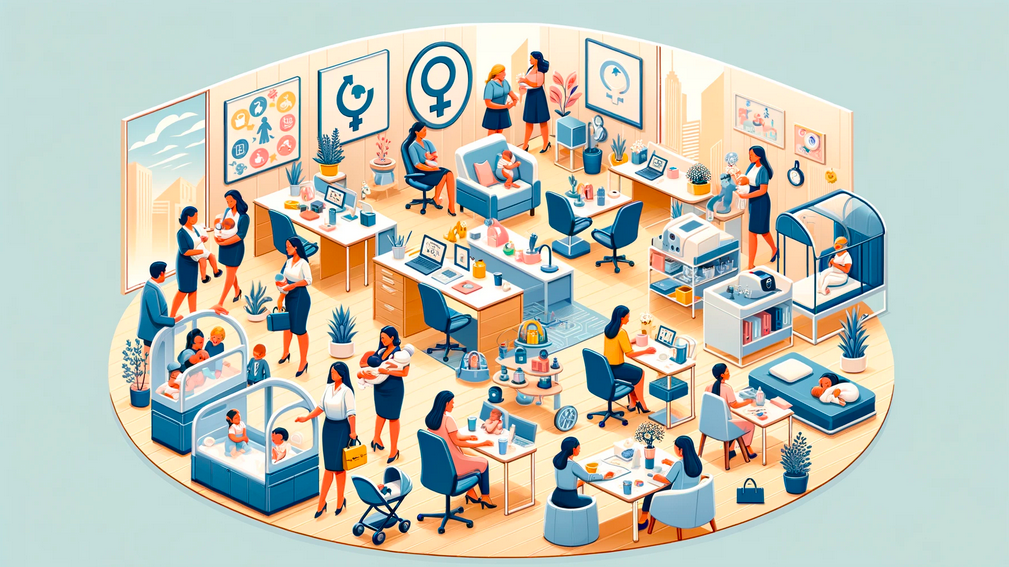Empowering Women In The Workplace
Empowering women at work isn't just fair—it's a must. It drives innovation, equality, and business success. Time to make it the norm.

In a world that's constantly evolving, it's crucial to shine a light on the significance of empowering women in professional settings. Reflecting on my entry into the workforce around 2010, I can't help but recall the harsh realities I encountered, particularly in male-dominated industries. It was a period marked by tough lessons, where I learned firsthand the importance of standing up for myself. These experiences even prompted me to reconsider my career aspirations. At that time, I struggled with confronting inappropriate jokes and unfriendly treatment in the workplace, which influenced my decisions moving forward. In this article we want to explore the multifaceted reasons why empowering women isn't just a matter of equality, but a strategic imperative for businesses and society alike. Let's uncover the transformative impact of gender diversity, dig into innovative approaches to fostering inclusivity, and celebrate the remarkable achievements of women breaking barriers in the workplace. Welcome to a journey of empowerment, enlightenment, and growth in the workplace.
Why Is It Important to Empower Women In the Workplace?
Empowering women in the workplace is crucial for several compelling reasons. Firstly, it fosters a culture of diversity and inclusion, where individuals from different backgrounds feel valued and respected. This diversity of perspectives leads to more innovative solutions and creative problem-solving, driving organizational success. Additionally, empowering women promotes gender equality, which is not only a fundamental human right but also essential for sustainable development. When women are given equal opportunities for career advancement and leadership roles, it not only benefits them individually but also contributes to the overall well-being of society.

Moreover, empowering women in the workplace has a ripple effect on future generations. By breaking down barriers and challenging stereotypes, organizations inspire young girls to pursue their dreams and aspirations without limitations. This fosters a more equitable society where success is not dependent on one's gender. Furthermore, research has shown that companies with diverse leadership teams tend to outperform their peers financially. By harnessing the full potential of women’s workforce, organizations can drive innovation, increase profitability, and gain a competitive edge in the market.
History Of Women In The Workplace
Throughout history, women have been pivotal in shaping societies and advocating for change in the workplace. Figures like Leymah Gbowee from Liberia, Nawal El Saadawi from Egypt, and Winnie Madikizela-Mandela from South Africa exemplify the significant contributions of African women to the fight for gender equality. In India, Kamaladevi Chattopadhyay fought tirelessly for women's rights and economic empowerment, while Emmeline Pankhurst led the charge for women's suffrage and labor rights in England.
In Eastern Europe, particularly during the communist era, women's participation in the workforce was actively promoted to meet the demands of industrialization efforts. State-supported childcare and healthcare systems allowed women to balance work and family responsibilities, providing them with greater economic autonomy.

Despite notable progress, challenges persist for female leadership and participation in the workplace across the globe in the 20th and 21st centuries. Gender biases, wage gaps, and limited representation in leadership roles are prevalent issues, affecting women's advancement in both male-dominated and more gender-equal societies alike. Even in countries known for lower gender disparities, such as Germany and Norway, where measures to address pay gaps and promote gender equality have been implemented, significant disparities still exist. These challenges underscore the need for continued efforts to dismantle systemic barriers and foster inclusive environments where women have equal opportunities to succeed.
Other posts from our blog:


The Power of Women in the Workforce
Women's participation in the workforce has profound implications for the economy, driving growth, productivity, and innovation. By tapping into the talents and skills of half the population, businesses and industries can access a broader pool of talent, leading to increased efficiency and competitiveness. Moreover, women's employment contributes to higher household incomes and greater consumer spending, stimulating economic activity and fueling demand for goods and services. Additionally, studies show that companies with diverse workforces, including significant female representation, are more resilient and better equipped to adapt to changing market conditions. Beyond the immediate economic benefits, women's participation in the workforce also leads to long-term gains, including reduced poverty rates, improved health outcomes, and greater social cohesion. Overall, harnessing the full potential of women in the workforce is not only essential for achieving gender equality but also for driving sustainable economic development and prosperity.

What Is The Gender Pay Gap?
The gender pay gap, a stark indicator of workplace inequality, measures the average difference in earnings between women and men. This gap not only reflects disparities in pay for the same roles but also underscores the broader issues of access to high-paying jobs and advancement opportunities. Equal Pay Day brings this issue to the forefront, marking how far into the new year women must work to earn what their male counterparts did in the previous year. In Germany, where women earn around 18% less than men, and in France, which faces similar challenges, Equal Pay Day is not just a date but a call to action.
Efforts to bridge this gap are gaining momentum, with organizations across these nations and beyond implementing a variety of strategies. These include enforcing transparency in pay, advocating for legislative reforms, and promoting women's engagement in traditionally male-dominated fields. Additionally, empowering women through mentoring, leadership development, and creating awareness around the importance of equal pay is pivotal. These initiatives aim not only to close the pay gap but also to cultivate an environment where women's work is equally valued, contributing to the broader goal of gender equality in the workplace.

What Do Women In The Workplace Experience Today and What Needs to Change?
While strides have been made towards gender equality, disparities in pay, representation in leadership roles, and workplace harassment persist. My experiences from more than a decade ago still exist. Women still often face implicit biases and microaggressions, hindering their advancement and contributing to a culture of exclusion. The intersectionality of gender with race, ethnicity, sexual orientation, and other factors further complicates these experiences, with women from marginalized communities facing compounded barriers.
To effect meaningful change, organizations must prioritize diversity, equity, and inclusion initiatives that address systemic biases and promote a culture of belonging. This includes implementing transparent and equitable hiring and promotion practices, offering mentorship and sponsorship opportunities, and fostering a workplace culture that values diverse perspectives and voices. Additionally, policies and legislation that address pay equity, parental leave, and childcare support are crucial steps towards creating an environment where all women can thrive professionally.
Upholding Reproductive Rights In the Workplace
Childbirth, pregnancy leave, maternity leave, and related rights such as parental leave and maternity protection are essential components of gender equality in the workplace, ensuring that women can balance their roles as caregivers and professionals without facing discrimination or disadvantage. These rights provide crucial support for women during pregnancy and childbirth, allowing them time off from work to recover physically and emotionally, bond with their newborns, and navigate the demands of early parenthood. Furthermore, parental leave and maternity protection extend these protections to encompass broader family needs, promoting greater gender equality in caregiving responsibilities.

However, these fundamental rights are often challenged by misogynistic arguments, typically espoused by people who dismiss the importance of supporting women's reproductive health and family responsibilities in the workplace. Such arguments perpetuate harmful stereotypes and reinforce unequal power dynamics, underscoring the ongoing need for advocacy and policy reforms to protect and uphold these rights for all individuals.
What Empowers Women In the Workplace?
Women have made remarkable strides in breaking barriers and shattering glass ceilings in the workplace, achieving unprecedented success in fields historically dominated by men. From becoming CEOs of Fortune 500 companies to leading groundbreaking scientific discoveries, women have proven their capabilities and talents across diverse industries.

What empowers women in the workplace is multifaceted: it's the recognition of their skills and contributions, the creation of inclusive work environments that value diversity, and the implementation of policies and practices that support their professional growth and advancement. It's about fostering a culture where women are not only encouraged to lean in but also provided with the resources and opportunities to thrive. Empowering women at the workplace means addressing systemic inequalities, challenging gender biases, and championing equal rights and opportunities for all. As women continue to break barriers and pave the way for future generations, our achievements serve as inspiration and catalysts for positive change in workplaces around the world.
Advancing Work-Life Balance with The Four-Day Workweek
The move towards a 4-day workweek, exemplified by countries like Sweden, Iceland, and Belgium (where it's now law), heralds a significant shift towards gender equality and empowerment in the workplace. This innovative approach acknowledges the disproportionate burden women often carry, balancing professional responsibilities with the lion's share of domestic and family duties. By legally enabling employees to condense work hours into fewer days without reducing pay, these policies aim to redistribute household responsibilities more equitably, offering men the opportunity to be more involved at home. This not only alleviates the pressure on women but also enriches their lives outside work, creating space for personal growth, community involvement, and well-being.
The global momentum of companies experimenting with this model underscores its potential to foster a healthier, more balanced life for all, especially for women who stand to gain immensely from the blend of professional fulfillment and personal freedom. This shift is not just about creating more time; it's about valuing and enhancing women's roles both in the workplace and at home, promoting a culture where we can thrive in every aspect of our lives.
From Challenge to Change: The Rise of Women's Empowerment in the Workplace
With over 15 years of professional experience, I've witnessed a significant transformation toward a more positive working environment for women. Yet, the most substantial change seems to stem from the women themselves. No longer are they content to be pigeonholed into traditional 'women's roles,' accept lower pay, or tolerate harassment and being underestimated in the workplace. Women are standing up, both as individuals and in unity, demanding the respect, equality, and opportunities they rightfully deserve. Empowering women in the workplace is not just a moral imperative but also a strategic business decision. It promotes diversity, equality, and inclusion, drives innovation and financial performance. The ongoing absence of women's empowerment as the norm serves as a nudge, reminding us of the journey still ahead on the road to equality. It's a whisper encouraging us to keep pushing forward, to ensure that empowered women in the workplace become not just an exception, but a delightful expectation.

What can I do in order to support woman in the workplace better?
To actively contribute to the empowerment of women in the workplace, consider these actionable steps you can take to do your share:
- Educate Yourself and Others: Familiarize yourself with the issues facing women in the workplace. This includes understanding the gender pay gap, recognizing unconscious biases, and learning about the challenges women face in male-dominated industries. Share this knowledge with colleagues and peers to raise awareness.
- Support and Mentor Women: If you're in a position to do so, mentor women in your workplace. Offer guidance, share your experiences, and provide support to those who are navigating their careers. Mentorship can be a powerful tool in helping women achieve their career goals.
- Advocate for Inclusive Policies: Advocate for policies that support gender equality and inclusivity in your workplace. This could include flexible working arrangements, parental leave policies, and measures to prevent harassment. If you're in a leadership position, you have a unique opportunity to influence change.
- Challenge Gender Stereotypes and Biases: Actively challenge and speak out against stereotypes and biases when you see them. This can be as simple as questioning gendered assumptions during meetings or offering opportunities to women that defy traditional roles.
- Celebrate Women's Achievements: Make it a point to recognize and celebrate the achievements of women in your workplace. Acknowledgement can go a long way in boosting confidence and visibility, which is crucial for career advancement.
- Support Women-Led Businesses: Outside of the workplace, you can contribute by supporting businesses led by women. Whether it's choosing services, buying products, or recommending them to your network, these actions help grow and sustain women's entrepreneurship.
- Engage in Open Conversations: Encourage discussions about gender equality and women's empowerment in the workplace. Open dialogues can lead to better understanding and cooperation among team members, fostering a more inclusive environment.
By taking these steps, you not only contribute to empowering women in your immediate surroundings but also help pave the way for a more equitable and inclusive workplace culture overall.


